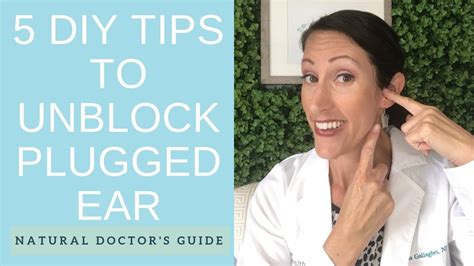The common cold, a ubiquitous affliction that brings with it a plethora of uncomfortable symptoms, including the oft-dreaded clogged ear. When your ear feels clogged due to a cold, it can be a frustrating and sometimes painful experience, affecting your ability to hear, balance, and even disrupting your daily life. But why does this happen, and more importantly, how can you find fast relief?
To understand the reasons behind a clogged ear from a cold, it’s essential to delve into the anatomy of the ear and the effects of cold viruses on the body. The ear is composed of three main parts: the outer ear, the middle ear, and the inner ear. The middle ear, located behind the eardrum, contains three tiny bones (ossicles) that transmit sound vibrations to the inner ear. It’s also connected to the back of the throat by the Eustachian tube, which equalizes air pressure in the ear.
When you have a cold, your body’s immune response triggers inflammation and the production of excess mucus. This mucus can build up in the Eustachian tube, causing it to become blocked. As a result, the air pressure in the middle ear becomes unequal, leading to a feeling of fullness or clogged sensation in the ear. Furthermore, the swelling of the nasal passages and the Eustachian tube can make it difficult for the tube to open and close properly, exacerbating the problem.
Another factor contributing to clogged ears during a cold is the accumulation of fluid in the middle ear. When the Eustachian tube is blocked, fluid can build up behind the eardrum, causing the eardrum to bulge. This can lead to discomfort, pain, and a feeling of the ear being clogged.
Now that we’ve explored the reasons behind clogged ears from a cold, let’s move on to the most crucial part: finding fast relief. Here are some tips to help you alleviate the discomfort:
Steam Inhalation: Breathe in warm, moist air to help loosen up the mucus in your Eustachian tube and nasal passages. You can do this by taking a hot shower, inhaling steam from a bowl of hot water, or using a humidifier.
Nasal Decongestants: Over-the-counter decongestants can help reduce the swelling in your nasal passages and Eustachian tube, making it easier for your ear to drain. However, it’s essential to use them as directed and not for extended periods, as they can have rebound effects.
Ear Drops: Certain ear drops, such as those containing ingredients like carbamide peroxide, can help dissolve earwax and reduce pressure in the ear. However, always consult with a healthcare professional before using any ear drops, especially if you have a perforated eardrum or are unsure about the cause of your clogged ear.
The Toynbee Maneuver: This simple technique involves swallowing while pinching your nose shut. The act of swallowing helps to open the Eustachian tube, allowing air to enter and equalize the pressure in your ear.
Stay Hydrated: Drinking plenty of fluids can help thin out the mucus, making it easier for your body to clear it out. Warm liquids like tea or broth can be particularly soothing.
Elevate Your Head: When sleeping, elevate your head with extra pillows to reduce congestion and help your Eustachian tube drain more easily.
Consider Over-the-Counter Pain Relievers: If your clogged ear is causing discomfort or pain, over-the-counter pain relievers like acetaminophen or ibuprofen can help. Always follow the recommended dosage and consult with a healthcare professional if you have any concerns.
In addition to these tips, it’s crucial to practice good cold management. This includes getting plenty of rest, avoiding irritants like smoke, and using a saline nasal spray to keep your nasal passages moist and clean.
Prevention: The Best Medicine

While it’s impossible to completely prevent colds, there are steps you can take to reduce your risk of getting a cold and, by extension, experiencing clogged ears. These include:
- Washing Your Hands Frequently: Especially during cold and flu season, keeping your hands clean can significantly reduce your risk of catching a cold.
- Avoiding Close Contact with Someone Who Has a Cold: Try to maintain a distance from individuals who are sick to reduce your chance of infection.
- Keeping Your Immune System Strong: Eating a balanced diet, staying hydrated, getting enough sleep, and exercising regularly can all help boost your immune system.
- Avoiding Smoking and Secondhand Smoke: Both can irritate your nasal passages and Eustachian tube, making you more susceptible to colds and clogged ears.
Conclusion
A clogged ear from a cold can be a frustrating experience, but understanding the underlying causes and taking proactive steps can provide fast relief. By combining these tips with good cold management and preventive measures, you can alleviate your symptoms and reduce the risk of future occurrences. Remember, if your symptoms are severe or persistent, consulting with a healthcare professional is the best course of action to ensure your comfort and health.
How long does it typically take for a clogged ear from a cold to clear up?
+The duration for a clogged ear to clear up can vary, but most people find relief within a few days to a week. It’s essential to be patient and continue with relief measures as the body fights off the cold virus.
Can I use ear candles to clear out my Eustachian tube?
+Ear candles are not recommended for clearing out the Eustachian tube or treating clogged ears. There is no scientific evidence supporting their effectiveness, and they can potentially cause more harm than good.
What are the signs that my clogged ear might be a more serious infection?
+Signs of a more serious infection include severe ear pain, discharge from the ear, fever over 102°F (39°C), and difficulty hearing. If you experience any of these symptoms, it’s crucial to seek medical attention as soon as possible.


